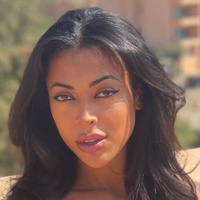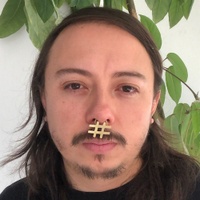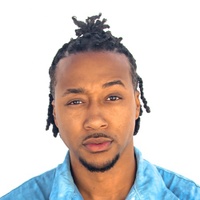On being an observer
Writer Celine Saintclare discusses rejecting timelessness, the moving markers of success, and why writer's block doesn't exist.Where do you write and what things do you need in order to do it?
I’ve written pretty much anywhere. But when it gets serious and it’s editing time, I need complete silence and no other human being or anything to see. I go to my local university library, to the silent study area where it’s completely empty. None of the kids use it at all. It’s literally just me. I’ve got an associate membership. But writing, I’ll write anywhere, on a notebook, laptop, napkin, whatever.
What is your editing process like?
I’m about to start editing my second novel today. It’s rough and gross at the moment, but I just ordered a bound manuscript, which turned up today, thankfully.
So I’m just going to read through it with all my new edits and everything I’m hoping the finished thing is going to be like and just highlight things that I really like that I’m going to use in the second draft.
And then I’ll get rid of anything that isn’t working and figure out what I’m moving around and what needs to be written next. Then, once I’ve gone through the whole manuscript manually, I’ll write a fresh draft with the bits that I really like from the first draft. But it is for more of an overview.
Did you order the bound manuscript on your own or is that something your publisher sent you?
No, I just order on my own.
Oh, that’s cool. Because then it’s like you have an actual book in your hand.
It puts my brain in a different gear. It’s like reading someone else’s work almost when it’s in print. It’s very helpful.
I know Sugar, Baby was your first novel. How did you go about finding its structure?
I needed a lot of help from my agent and then from my editors because when I first wrote it, I was literally just writing. My idea of a plot was, “lots of stuff happens, lots of fun stuff happens.” I had way too much in it, so it had to be cut down. And then we worked quite a lot on structure. I definitely needed to work on a sense of pace. It was way too packed.
Was the word count much longer in the initial drafts?
Yeah, it was a lot longer. We cut out a lot. I think it was still a hundred thousand words or more when it went on submission to publishers.
Wow, that’s impressive. Some writers I know avoid pop culture references in their writing, because they’re afraid it will age the work. But you really leaned into it. Was that a conscious consideration?
I just saw it as really hard to separate the kind of story that I was writing from the world around it. And these kinds of girls, they would be super aware of pop culture. They’re girls who are 21 and there’s no way that they wouldn’t reference what’s going on in celebrities and fashion brands and stuff like that. So it was a deliberate choice. Also, I really wasn’t trying to write a timeless novel at all.
Sugar, Baby is so of-the-moment. This wouldn’t have happened in any other time in history. It is absolutely of-now. If anything, I am more proud if it is very reflective of a certain time. I know some people hate that. I feel like it’s a controversial thing to talk about TikTok and YouTube and stuff. But yeah, it would’ve been a choice not to do it, and I don’t think that would’ve made sense.
It feels almost archival, like if someone picks it up in 50 years they’ll have a full experience of what this time in history was like. It’s cool that you’re not afraid to lean into it and embrace the moment.
I loved your descriptions of Agnes’s photos—the way she composes and what she chooses to capture. I was curious if you work in any other artistic mediums besides writing, or if the photography plotline required a lot of research.
I don’t, but I have been interested in various things. I love to watch documentaries on art history. I like the idea of old portraits of royalty, when they put different objects in the picture. It’s symbolism and it’s telling you something about the person’s life and maybe the artist is sneaking in there.
I’m interested in hidden messages and pictures and composition. Agnes’s interest in photography, especially of women, the Helmut Newton pictures, is all about the presentation of a woman or the image of a woman. She’s looking for something that’s different from the religious image she’s been given while growing up. She’s been looking for something more to identify with and I think that stirs something in her, these kinds of glamorous pictures.
I read your essay in Vogue. In America, I don’t think we have the term “image girl,” we call it party promoter or club promoter or what have you, but I like the word “image girl” because that’s exactly what it is. Did your experience of an image girl impact your story? Did something from it inspire the novel?
Yeah, definitely. I kind of stumbled into that scene and had zero idea that it existed, but then I was like, “Oh, this is so cool.” It’s like being sponsored to go out and have fun. I became interested in all the power dynamics. I remember being in the middle of these parties and feeling like, “This is so fun and amazing that we’re so welcome and everyone wants us here, but how much is that going to change in five years?”
It’s very conditional and it made me think a lot about how fleeting of a currency it is to be young and attractive. You can go out and trade and make the most of it, but you’ve got this kind of panic in the back of your mind at all times that it’s so temporary.
That is definitely at the heart of the novel. I think all the girls feel that. I had lots of friends who were professional models and I was shocked by the insecurity that they felt and the sense of time running out. They were so beautiful to anyone just to look at them, but to them it’s like they’re comparing themselves to someone else.
This reminds me: during the past week or so, I’ve been seeing a lot of articles about how Gen Z is terrified of turning 30. What do you think is causing this panic? Do you think it has to do with social media and filters or do you think this panic has existed for every generation?
I actually have no idea really. I think it’s a mix of things. It is alarming. There’s kids who are skincare influences using Retinol and they’re 12 and 13. It’s crazy.
I think part of it is the beauty industry’s pushing and anti-aging influencers. People are like, “Oh my god, do you have lines? You need to use this!” And people are like, “Oh my god, I look old.”
You hear podcast boys talking about, “Oh, once a girl’s over 25, she’s old,” or whatever. I think it’s lots of things, but I definitely think it’s a hysteria. Also, when you look like your age, people think you look much younger than you are because they have this picture in their mind of 30 as some old hag or something.
I’m 27 now, but a few years ago I was out at a bar and I was talking about birth charts and star signs with someone in the girl’s toilet and she’s like, “Oh, 1996, how old are you?” I was like, “I’m 25.” And she’s like, “Oh my god, you don’t look at it.” What do you think 25 looks like? She was 19, but I think she probably thought in a couple of years she’s going to look like an old woman or something. It’s just a weird perception.
I always assume someone’s the same age as I am, unless they look drastically different. I don’t think other people notice the little things that we notice about ourselves.
No, definitely not. It’s not like you’re going to be 22 one day and then you’re 28 and you look like you’ve aged a hundred years or something.
Exactly. So I know that you have a degree in social anthropology. In what ways has this impacted your writing, if at all?
Lots of ways, really. I wanted to do anthropology because I’m interested in different customs and cultures and what the world looks like for other people, through their belief systems and how things work. And then when I discovered this world of image modeling and sugar babies and sugar daddies, I was sort of looking at it from an anthropological perspective—I was intrigued by how these things happen and who says what and the surrounding expectations.
It’s like a micro society. You suddenly meet all these people and everyone’s got a sugar daddy, or everyone gets paid for this, that, and the other, and they end up forming friendships in this little world. I was taking notes almost like I used to take field notes for anthropology, which is essentially just a diary of what happened, just an observational kind of thing. And anthropology is supposed to be without judgment, you’re literally just an observer. From those sort of notes is where I decided to adapt it into a novel, really. It influenced the book quite a lot.
I liked how that you didn’t write sex work to be some miserable, desperate, dark act. Agnes is genuinely into the sugar daddy she chooses and can have a good time, not regret it the morning after, etc. Was this an intention, the way that you represented sex work?
Yeah. And it’s actually quite controversial because I’ve had messages from lots of girls being like, “Oh, I used to do this,” or “I do this,” or “I have friends who do this, and you did a really, really good job, it’s so true to life, it’s really realistic.” And then I’ve had comments online or reviews from people being like, “How is she fine at the end? And why isn’t she more affected?”
I could have catered more to this kind of cautionary tale where her life is just completely in ruins, but that’s just not realistic. And that’s also not the book that I wanted to write at all. Because for the majority of people who do this kind of thing, it really is a lifestyle choice that, yes, has its disadvantages and, yes, can put you in some dangerous situations, but ultimately it’s usually fine. Otherwise, why would you do it as a young woman? It just doesn’t make sense.
As far as your creative work is concerned, how do you define success and how do you define failure?
I think with writing, you never really feel like it’s successful. There’s always a moving marker. First, you think you’re a success if you get an agent, and then you get a publishing deal. But then it’s always like you want to see the figures and then you’ve got to do it again.
And right now I’m just like, “Oh my god, I’m so stressed out about my second book.” So I don’t know. I mean, But I guess it’s a success if you’re proud of it. That’s the ultimate aim. Then the external stuff doesn’t matter as much. It’s definitely different now that it’s my job. Those markers have changed.
Are you working outside of writing or is that your primary gig now?
It’s my primary thing now, yeah. Which is good because I went traveling for a bit. And London is so expensive, but it’s really good to go elsewhere and just kind of digital nomad for a bit and stuff like that. So for now, it is my primary thing, but we’re not home and dry. I really need to pull an amazing second book out of the bag, for sure.
Are you dedicating a certain amount of hours per day for writing, like you would a day job?
Normally when I’m doing the first draft or something where there’s lots of new writing, it will be just a thousand words because then I start to kind of lose it, but it’s a measurable thing where I’m like, “Okay, I’ve done my word count, so I’m good.”
But now I will probably be working the majority of every day to get to a good stage before I start officially writing my second draft. The editing is always crazy for me because I’m always behind my deadline.
Are you allowed to reveal anything about your next novel? Or do you wish to?
I actually don’t know if I’m allowed to, but no one’s stopped me. It’s a ballet inspired story about love, rage, revenge, and obsession with another person. I’m really excited. It’s like Black Swan meets John Tucker Must Die.
Those are such good comp titles to have, too. What’s the most surprising thing you’ve learned along your creative path?
The most surprising thing is that writer’s block doesn’t exist, but sometimes it takes two weeks to come up with the thing, the paragraph, or the idea that’ll solve it. So there is an answer somewhere, but it might take a really, really long time for it to formulate in my mind. It’s a long process sometimes, and I just have to accept that.
Have you found any tricks for expediting the process?
Just time, thinking time. When I feel like things are really bad and I’m like, “Oh my god, I have all these suggestions of edits and scenes and stuff, and I don’t know what’s working,” I would just not do anything for a week or two and then I’ll think of something good. So, nothing but time.
But I do think that reading books and watching films helps to get back into a storytelling perspective and into someone else’s head or someone else’s words. So yeah, time and inspiration.
Celine Saintclare Recommends:
Kiehls skin products
regular baths with lavender and Eucalyptus oil
spending time around horses
learning a language
journaling




